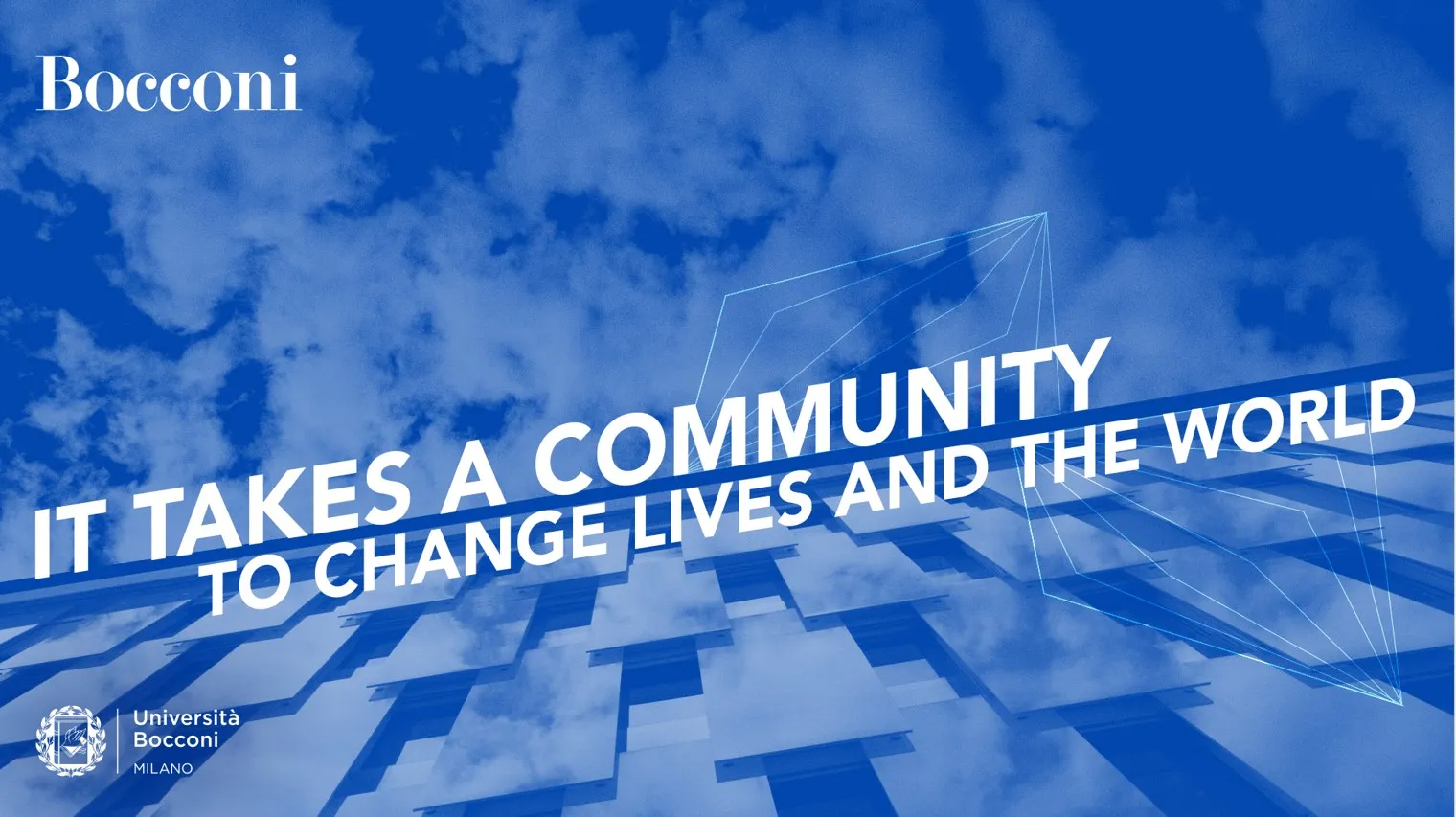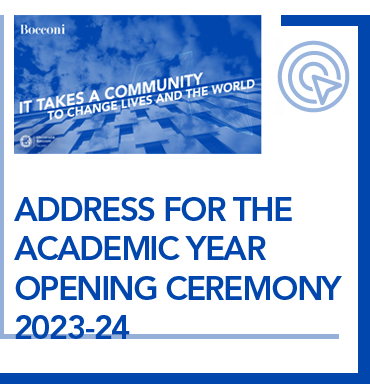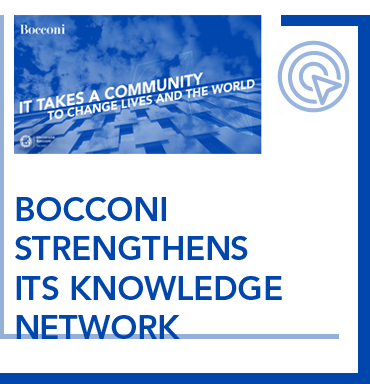
Bocconi: A Community Committed to Inclusion
A University designed and developed to cultivate intellectuals accustomed to reasoning with a multidisciplinary and analytical approach, with diversity, sustainability and inclusion as their guiding light. These intellectuals, both students and researchers, are able to leave a lasting legacy on the world by helping overcome global challenges: whether they are triggered by demographic trends, the democracy crisis, impact of the digital revolution or sustainable growth. A university that is a community of 165,000 members including students, faculty, staff, alumnae and alumni, that draws strength from its own diversity and is continuously committed to opening up to new inputs and contributions. A university whose strategy aims at the inclusion of talents, as well as environmental, social and economic sustainability.
Bocconi University's commitment on all these fronts was the focus of the Opening Ceremony of the 2023-2024 Academic Year, the 122nd year in the history of the University. The ceremony was attended by the President of the University, Andrea Sironi, Rector Francesco Billari, the Director-General of the World Trade Organization, Ngozi Okonjo-Iweala – the first woman and the first African to hold the position of WTO Director-General – and Guerino Figlino, student representative on the Bocconi University Board.
"The University's mission is not only to develop and disseminate knowledge, but also to promote economic growth and social mobility," says Sironi. "Training young people and offering them opportunities is an important factor for the growth and development of the economic and social system. Reducing inequality is also Ngozi Okonjo-Iweala's guiding light at the WTO. The establishment of the multilateral trading system more than seven decades ago was based on the understanding that interdependence and cooperation contribute to peace and shared prosperity. More recently, however, these beliefs have been undermined by uncertainties and fears that globalization exposes countries to excessive risks. To make our economies safer, more inclusive and more sustainable, re-globalization is a much more effective solution to global challenges than fragmentation – especially if we are able to include developing economies with the right trade environment in the process. Our University has always been a strong supporter of open societies, open economies and free trade."
"While in Italy we are at an all-time low in births, the world is full of young people. Just one number: the 144 million births in 2012 worldwide, which will probably be the largest birth cohort ever seen in the history of humanity. These are young talents that must be cultivated in order to help them blossom, because they are part of the generation that will have to face the global challenges of today and tomorrow. With them, we must learn to govern climate change and respond to the crises of democracy and peace that the world is experiencing. From the invasion of Russia in Ukraine, to the recurrence of the historic and unresolved Israeli-Palestinian conflict a little further along the Mediterranean, which started with the terrible Hamas terrorist acts, to the many wars that continue to be fought in every corner of the earth (170 ongoing conflicts). Bocconi's commitment," concludes the Rector, "is to contribute to changing the lives of many young people, selected based on merit and supported according to their socioeconomic backgrounds, and change the trajectory of the world through them."
Bocconi, a social elevator for an open community
For this reason, Bocconi has not forgotten its role as a social elevator. Attending Bocconi must not – and cannot – be a privilege. Yet, an institution like ours, which is non-profit and aspires to have a global impact, must constantly pay attention to budget sustainability, and seek continuous improvements in teaching, research and campus life, for its entire community.
In order to guarantee access to quality education for many young people regardless of their socioeconomic backgrounds, Bocconi has activated scholarships, tuition waivers and 19 funds to support students – through the support of individuals, companies and foundations. Thanks to both these donors and the direct contribution of the University – which together account for 78% of the funds allocated to supporting students, with the remaining 22% from regional and national funds for the right to education – 4,236 students in the 2022-2023 academic year received aid in the form of scholarships or tuition waivers, representing 30.8% of the entire student community. In particular, for 10% of our students enrolled in the 2022-2023 academic year, financial aid covered the entire amount of tuition and fees. For those admitted to the Una Scelta Possibile program, this also took the form of an additional scholarship and services, including room and board.
Today, Bocconi is a community of over 15,400 students (26% of whom are international) – joined by more than 1,900 international students for one semester from 286 partner universities every year – as well as 424 core faculty members (25.2% international), 717 staff members and over 135,000 alumnae and alumni worldwide.
English, the language of inclusion
The global world and an open community increasingly require the use of a lingua franca, which today is English. Thus, Bocconi's educational offer will focus more and more on this language. From the 32 class groups with teaching in English out of a total of 53 in the three Schools (Undergraduate, Graduate and Law), in the next academic year 40 out of 54 will be taught in English. Already today, 62% of teaching hours are held in English and, with the same educational offer, the projection is that in three years' time – in 2026-2027 – teaching in English will be 73% of the total. However, since teaching in English should not be a reason for exclusion, Bocconi has launched a new support program for students. Students admitted to the 2024-2025 academic year at Bocconi (with tests that do not discriminate between Italian and English) who have not yet reached the level of English required to access programs will have free access to a personalized online teaching plan. At the end of the course, they will be able to take a test that certifies their knowledge of the language.
Impactful research
A university that aspires to be a point of reference as a research university in the social sciences must be able to develop new knowledge, as well as disseminate knowledge. On this front, the numbers the Rector listed speak for themselves: The cumulative number of European Research Council grants awarded since 2007 – the year in which the grants funded by the ERC were established – is 61. Bocconi is the leader in Italy in absolute terms and first in Europe in the SH1 sector (Individuals, Markets and Organizations) with 34 grants awarded. Overall, Bocconi has obtained about €87.5 million in funding (including €10.5 million from the latest call for applications) for frontier projects. Again at the European level, Bocconi has also obtained important funding this year as part of the Innovative Health Initiative (IHI), a public-private partnership between the European Union and European life sciences industries. At the Italian level, Bocconi researchers have been awarded both by the Italian Science Fund (FIS) – with over €2 million – and by PRIN calls and MIMIT, the Ministry of Enterprises and Made in Italy. In the last year, 58 PRIN projects received funding, totaling €4 million.
In terms of the network created together with its partners, the connection between impactful research and teaching is represented by named chairs: five chairs have been or will be inaugurated this year, which represent a further commitment to strengthening Bocconi's expertise in the fields of behavioral sciences and computer science, as well as traditional European studies. Regarding this area in particular, the Institute for European Policymaking (IEP@BU) launched its activities this year, unveiled last December in the presence of the President of the Italian Republic, Sergio Mattarella, and the President of the European Commission, Ursula von der Leyen.
Impact on the territory
Starting from its campus, which has made sustainability its key word – one fact says it all: according to forecasts, Bocconi should achieve carbon neutrality by 2025 – the University is committed to a continuous positive impact on the territory. Examples of this are the new initiatives related to inclusion launched this year. One is the A scuola di inclusione (Inclusion at School) project dedicated to high school students, carried out as part of the activities of the University's Dean for Diversity, Inclusion and Sustainability. Another is the Social Inclusion Lab, created as part of the MUSA project to promote social inclusion through rigorous and innovative research that addresses concrete challenges to impact local communities.
Another example is a commitment to entrepreneurship through the B4i-Bocconi for Innovation accelerator. During its four years of activity, it has supported 465 entrepreneurs from 156 startups. There is also a commitment to making an impactful contribution to the entire ecosystem of companies and institutions, thanks to the specialized training provided by the SDA Bocconi School of Management. The School, which the leading international rankings place in the European top five (fourth in Europe in the Financial Times ranking of European Business Schools and in third position with its MBA), is one of the 122 Business Schools in the world – out of more than 12,000 surveyed – to have a Triple Crown qualification, i.e. to have obtained the three most important certifications in the world of business education. Every year, 12,000 executives, entrepreneurs, and employees in government and institutions attend a program at the School, with 40% of programs held in English and aimed at an international audience.

